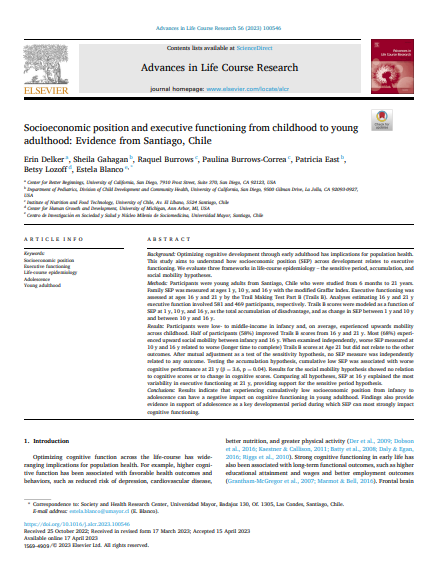Socioeconomic position and executive functioning from childhood to young adulthood: Evidence from Santiago, Chile

Fecha
2023-04Autor
Delker, Erin
Gahagan, Sheila
Burrows, Raquel
Burrows-Correa, Paulina
East, Patricia
Lozoff, Betsy
Blanco, Estela [Univ Mayor, Ctr Invest Soc & Salud, Chile]
Ubicación geográfica
Notas
HERRAMIENTAS
Acceda a títulos restringidos
¿Cómo descargar?Resumen
Background: Optimizing cognitive development through early adulthood has implications for population health. This study aims to understand how socioeconomic position (SEP) across development relates to executive functioning. We evaluate three frameworks in life-course epidemiology - the sensitive period, accumulation, and social mobility hypotheses.Methods: Participants were young adults from Santiago, Chile who were studied from 6 months to 21 years. Family SEP was measured at ages 1 y, 10 y, and 16 y with the modified Graffar Index. Executive functioning was assessed at ages 16 y and 21 y by the Trail Making Test Part B (Trails B). Analyses estimating 16 y and 21 y executive function involved 581 and 469 participants, respectively. Trails B scores were modeled as a function of SEP at 1 y, 10 y, and 16 y, as the total accumulation of disadvantage, and as change in SEP between 1 y and 10 y and between 10 y and 16 y.Results: Participants were low-to middle-income in infancy and, on average, experienced upwards mobility across childhood. Half of participants (58%) improved Trails B scores from 16 y and 21 y. Most (68%) experi-enced upward social mobility between infancy and 16 y. When examined independently, worse SEP measured at 10 y and 16 y related to worse (longer time to complete) Trails B scores at Age 21 but did not relate to the other outcomes. After mutual adjustment as a test of the sensitivity hypothesis, no SEP measure was independently related to any outcome. Testing the accumulation hypothesis, cumulative low SEP was associated with worse cognitive performance at 21 y (beta symbolscript 3.6, p symbolscript 0.04).Results for the social mobility hypothesis showed no relation to cognitive scores or to change in cognitive scores. Comparing all hypotheses, SEP at 16 y explained the most variability in executive functioning at 21 y, providing support for the sensitive period hypothesis.Conclusions: Results indicate that experiencing cumulatively low socioeconomic position from infancy to adolescence can have a negative impact on cognitive functioning in young adulthood. Findings also provide evidence in support of adolescence as a key developmental period during which SEP can most strongly impact cognitive functioning.
URI
https://repositorio.umayor.cl/xmlui/handle/sibum/9473https://ciss.umayor.cl/equipo/estela-blanco-phd-mph-ma
https://doi.org/10.1016/j.alcr.2023.100546
https://europepmc.org/article/MED/38054890
https://www.sciencedirect.com/science/article/abs/pii/S1040260823000217
https://www-sciencedirect-com.bibliotecadigital.umayor.cl:2443/science/article/pii/S1040260823000217?via%3Dihub
Coleccion/es a la/s que pertenece:
Si usted es autor(a) de este documento y NO desea que su publicación tenga acceso público en este repositorio, por favor complete el formulario aquí.